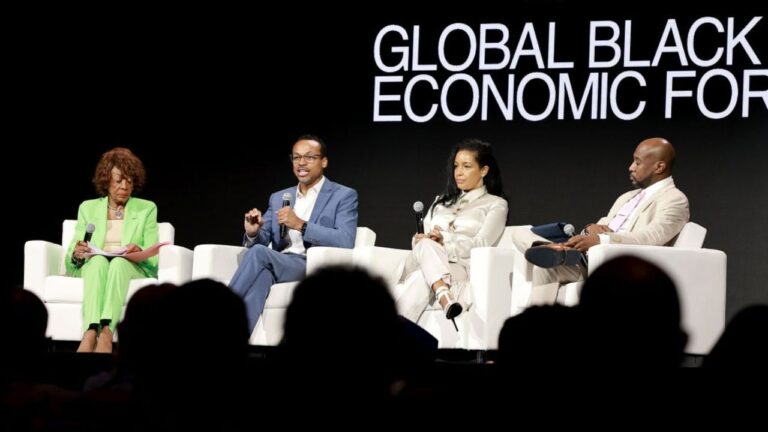Photo by Arturo Holmes/Getty Images for Essence
A fascinating panel discussion moderated by Jabari Young, senior writer and editor at Forbes, brought together influential figures such as Congressman Maxine Waters, Sean Wooden, and Monique Idlett to analyze the pivotal role of Black banks in cultivating Black capital. The discussion at this year’s Global Black Economic Forum at ESSENCE Fest highlighted the necessity of Black banks in mitigating racial and economic disparities and propelling communities towards economic empowerment.
Wooden kicked off the conversation by describing the stark wealth inequality facing black Americans. “Wealth isn’t just about high income,” he emphasized. It’s assets minus liabilities.” The chief public pension strategist at Apollo Global Management and former Treasury Secretary of Connecticut highlighted the troubling reality that black communities are often at the bottom of the ladder when it comes to wealth accumulation.
Wooden pointed to systemic discrimination in the financial services industry as a fundamental barrier that has historically hindered wealth creation for Black people. “We need to stop focusing on purchasing power and start focusing on wealth creation,” he said, emphasizing the importance of owning, saving and investing.
As the conversation continued, Young shared a sobering statistic: White entrepreneurs typically start their companies with an average of $107,000 in capital, while Black entrepreneurs start with just $35,000. “This disparity is a fundamental problem,” he noted. “We need to foster an environment where Black entrepreneurs have access to significant venture capital.”
Monique Idlett, founder and managing partner at Rain Ventures, offered a sharp analysis of the venture capital landscape. “Venture capital is the sector that has the highest return on investment,” she explained. “We need more Black-owned firms investing in potentially multi-billion-dollar companies founded by Black and brown entrepreneurs.” Idlett highlighted the disparity in venture capital, noting that less than 2% of capital goes to Black women. She highlighted the success of Black-owned venture firms like Fairview and Rain Ventures, which have shown superior returns and challenged the bias in capital allocation.
A significant part of the discussion centered on the role of black banks, with Young noting that there are currently only 23 black banks in the United States, with combined assets of just $8 billion, a stark contrast to the assets of the larger banks.
“Black banks suffer from the same undercapitalization that Black people have suffered historically in this country,” Rep. Waters said. “They don’t have the investment that some of the larger banks have.” Panelists agreed that these institutions are vital for lending to small businesses and supporting community development — areas that larger banks often ignore. “We need elected officials who will push for investment in these smaller institutions,” Waters argued.
Idelet added that Rain Ventures actively funds companies that address predatory lending and financial exclusion. She cited the example of Solo Fund, a Black-owned venture that provides a peer-to-peer marketplace to serve under-resourced communities. “These disruptive solutions need legislative support to succeed,” she argued, highlighting the intersection of public policy and private investment in building an equitable financial system.
The conversation also touched on the importance of savings and investment in the black community. Wooden highlighted the low savings rate among black Americans and the need for financial literacy. “We need to have more savers and investors, not consumers and spenders,” Wooden argued, highlighting the power of compound interest and the role it plays in accumulating wealth.
In conclusion, the panelists proposed a multifaceted approach to closing the racial wealth gap, including increasing the number of Black-owned banks and venture capital firms, promoting financial literacy, and using public policy to dismantle systemic barriers. As Waters aptly put it, “This is a time for all of us to do this. We need to open the doors to opportunity and ensure capital flows into our communities.”
The panel highlighted the essential role of Black banks and the broader financial ecosystem in advancing Black capital and promoting economic equality. Participants shared their hope for a more equitable financial future through collaborative efforts and targeted initiatives.


